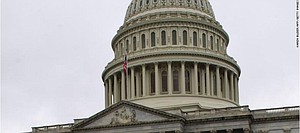3/9/2023

Originally Published: 09 MAR 23 12:48 ET
Updated: 09 MAR 23 13:08 ET
By Sydney Kashiwagi, CNN
(CNN) -- The Senate voted Thursday to confirm Daniel Werfel, the former acting commissioner of the Internal Revenue Service, to lead the IRS.
He was approved on a bipartisan 54-42 vote.
Werfel's confirmation to the agency comes after he was grilled by the Senate Committee on Finance last month on how he plans to utilize the money in new funding coming to the IRS over the next decade to revitalize the tax agency as taxpayers could see increased audit rates. Democrats approved the $80 billion for the agency last year when they approved the Inflation Reduction Act in a party-line vote. Democrats backed the funding in its bid to crack down on tax dodgers and to provide better services for taxpayers, arguing that the IRS could boost federal revenue by more than $100 billion over the 10-year time period if they collect more in taxes.
But Republicans have made the IRS and the new funding a political target, claiming that the money will create additional audits for taxpayers.
After Republicans took control of the House earlier this year, two of the party's first legislative votes were aimed at the IRS. One bill called for rescinding roughly all the new funding for the agency and others called for abolishing the IRS altogether. However, it is highly unlikely that either bill will become law because Democrats still control the Senate.
Werfel said last month he would follow through on Treasury Secretary Janet Yellen's previous directive that the IRS will not use the new funding to increase audit rates, relative to historic levels, for households making less than $400,000 a year.
"If I am fortunate enough to be confirmed, the audit and compliance priorities will be focused on enhancing the IRS' capabilities to ensure that America's highest earners comply with applicable tax laws," Werfel said at the February hearing.
"If poor people are more likely to be audited than the wealthy, that is something I think potentially degrades public trust and needs to be addressed within the tax system," he added.
But ranking Republican committee member, Republican Sen. Mike Crapo of Idaho, said at the time he remains "very concerned" about how twhe funds will be used to increase tax enforcement, pointing out that Yellen's directive "leaves a lot of wiggle room."
"I don't expect to see wiggle room in this commitment," Crapo told Werfel.
The Inflation Reduction Act states that the new investment going to IRS is not "intended to increase taxes on any taxpayer or small business with a taxable income below $400,000." However, there is some uncertainty about how the IRS will decide how it will ramp up audits.
Moderate Democratic Sen. Joe Manchin of West Virginia voted against Werfel's nomination. He has also opposed several of President Joe Biden's other recent nominees.
Manchin said his vote against Werfel had to do with the Biden administration ignoring the "congressional intent" in implementing the Inflation Reduction Act.
"As far as the gentleman for the IRS, most qualified, he'll do a good job. That was a message I'm sending because the president and his administration is not adhering to the piece of legislation called the Inflation Reduction Act," Manchin said on "CNN This Morning" Thursday ahead of the vote, explaining his reasoning for voting against Werfel. "They have touted that as strictly an environmental bill."
Werfel was the acting IRS commissioner for seven months in 2013 during a difficult time for the agency. His predecessor had resigned following revelations that the agency targeted conservative groups seeking tax-exempt status for extra scrutiny.
Before his stint at the IRS, Werfel worked for nearly 16 years at the White House's Office of Management and Budget, where he served as deputy controller and later federal controller.
After he left government, Werfel joined Boston Consulting Group, where he is currently a managing director and partner on the federal and public sector teams.
This story has been updated with additional developments.
